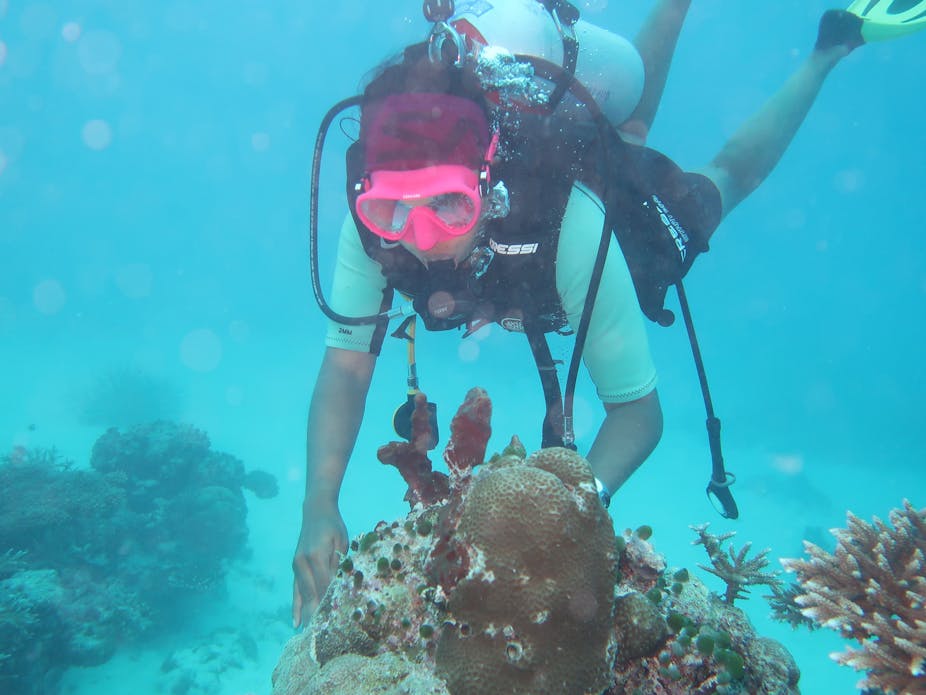For thousands of years, medicines have been developed from natural sources – mostly from plants. In recent decades, though, drug hunters have been looking at the immense diversity of marine organisms as potential sources of new medicines.
Marine sponges have garnered particular attention. They are considered champion producers of molecules (known as “natural products”). They produce these because they use toxic compounds to deter predators, communicate with their neighbours, or prevent algae and bacteria from growing on them.
Marine sponges are a remarkably diverse group of animals, with over 9,000 species. They come in a wide array of shapes, sizes and colours, ranging from small, inconspicuous forms to large and vibrant reef-building varieties. They look like a sedentary blob of porous tissue on the seafloor, which gives them their name.
As some of the most primitive animals on the planet, they lack complex organs and tissues. Without physical and mechanical features to flee (fins, legs), attack (spines), and protect themselves (shells), they have evolved to survive by producing chemical compounds. Some of these compounds have been found to possess valuable properties against cancer and microbial infections.
Interest in these properties started in the early 1950s after the discovery of two new natural products from the Caribbean sponge species Tectitethya crypta. The products were later approved for use as drugs against leukemia and HIV.
Discoveries like this have raised substantial interest in therapeutic applications of sponge-derived chemicals.
This is where my home country, Mauritius, has huge potential. Mauritius has an array of sponge species, offering the opportunity to discover bioactive agents.
I obtained my PhD in the field of applied marine biochemistry at the University of Mauritius. As part of my studies I worked with my research supervisors Ranjeet Bhagooli, Theeshan Bahorun, Vidushi Neergheen and late Alexander Kagansky to study the anticancer potential of the sponge Neopetrosia exigua from Mauritius waters.
We have just published a paper which shows, for the first time, that chemicals produced by N. exigua have the capacity to selectively kill liver cancer cells, with minimal harm to normal cells. Based on our findings about its pharmacological properties we suggest that the Mauritian sponge N. exigua has potential to be developed into a less toxic therapeutic candidate against liver cancer.
Our study is the first stage of the biodiscovery process. There are numerous steps which can take around 15 to 20 years from discovery of active compounds to use as medicines in humans.
Studying how a sponge kills cancer cells
Before our study, Neopetrosia species were already known to be a rich source of bioactive novel compounds, yet studies showing how they killed cancer cells were limited.

For our study, the first step was to collect a sample of N. exigua sponge from the Mauritian coral reefs by snorkelling and scuba diving. What could be better for a passionate lover of the sea than to have one of the world’s most pristine marine ecosystems as her working environment?
Once we had our sample, the sponge was carefully processed in the laboratory to obtain different extracts containing distinct natural products. These extracts were tested at the University of Edinburgh for their toxic effects against a panel of human cancer cell lines. Cell lines are groups of cells derived from living organisms that can keep growing and dividing in the lab. Scientists use them to learn about how cells work, test new medicines, and figure out how diseases function.
We also assessed the effects of the sponge extracts on non-cancerous cells to see how toxic they were to normal cells. This is particularly interesting since some anticancer treatments induce DNA damage indiscriminately, killing both normal and cancer cells. Cancer patients on those treatments may suffer from adverse side effects including nausea, anaemia, fatigue, hair loss and infections.
We found that one particular extract had the ability to selectively kill liver cancer cells at very low doses while displaying very low toxicity towards normal cells.
We also observed how the extract did this: N. exigua constituents activated various proteins that led to the breakdown of the liver cancer cells through a programmed cell death process called apoptosis. This process helps maintain the overall health and balance of an organism by getting rid of unwanted or potentially harmful cells. When apoptosis malfunctions, these harmful cells can continue to grow and divide, potentially forming a tumour.
Biodiscovery process
To validate the extract’s potential use, the next step will be to isolate and identify the natural products accountable for its anticancer activity using advanced analytical techniques such as chromatography and mass spectrometry.
This will set the stage for future evaluations in suitable experimental animal models to probe its efficacy and toxicity. If this step is successful, the tests proceed with humans in clinical trials.
Scientific data about the pharmacological properties of Mauritian marine organisms could create opportunities to promote marine biodiscovery research and sustainable use of the ocean resources in Mauritius. It will also add another reason to conserve the country’s marine biodiversity.
The marine sponge Neopetrosia exigua is highly distributed in the Indian Ocean, Atlantic Ocean (Caribbean Sea) and Pacific Ocean. However, its population density has significantly declined over the last few years in Mauritius due to a continued rise in ocean temperatures.

